Deus Ex's James Swallow – "Game characters are often ciphers"
- Updated: 26th Aug, 2011
 After eight years of waiting, Deus Ex: Human Revolution is finally here. I talked to Deus Ex author and veteran games writer James Swallow about balancing a story across multiple media and the state of writing in games today.
After eight years of waiting, Deus Ex: Human Revolution is finally here. I talked to Deus Ex author and veteran games writer James Swallow about balancing a story across multiple media and the state of writing in games today.
Swallow is the External Game Writer on Deus Ex: Human Revolution as well as the author of tie-in novel Icarus Effect. By far one of the best game novels I have read, Icarus Effect fleshes out much of the story behind how Jensen came to be augmented. As part of the writing team under Mary DeMarle, Swallow was also responsible for much of the detail that went into creating the game world. He wrote many of the ebooks you”ll find littered about the world (look out for Hearts of Steel). Some of the minutia that goes into making a world feel real is just incredible. Take a look at the superb packages for an augmentation sleeve that was sent out to promote the game.
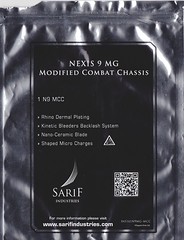 As a writer across two media was there a lot of difficulty balancing what goes in the book against what goes in the game?
As a writer across two media was there a lot of difficulty balancing what goes in the book against what goes in the game?
Oh yeah. We had an entire storyline that I worked out. We looked at it and were like “Actually, this gives away too much of the game. Dial it back.” There”s some really cool stuff in the game. I”ve been working on the game for four years now. There”s a lot of really cool stuff but we had to be really careful because the novel came out before the game. We had to tread a very fine line and make it so that if you buy the book after the game comes out, it won”t seem like old news but we also had to make it so if you bought the book before the game came out it didn”t spoil too much stuff.
There are some facts and things that are revealed in the novel but it”s kind of dipping your toe into the ocean that is Deus Ex. We reveal a few small things but those things get opened up much more when you actually play the game and get more involved with those characters, the conspiracy groups, the actions and the environments.
Were you involved with any of the marketing campaign, Sarif Industries the website and the hacking thing?
No, that was new to me. That was really cool actually. I got to see that at the same time as everybody else.
We worked very hard to build the concept of Sarif Industries and all of the corporations that appear in the game as wholly realised entities with corporate philosophies, design styles and even their own personalities. In a way, they”re almost characters in the story. This is a world where – as it says in the trailer – corporations have more power than the government. They are major nation-states. The world of Deus Ex is being manipulated by these people and they in turn are being manipulated by other groups.
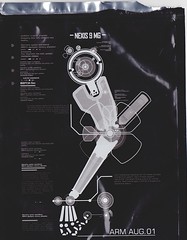 It was important to create a realistic, contiguous sense of the world and I think one of the things they did really well was with the advertising campaign is to give you the sense that Sarif industries could be a real thing – that you could walk into one of their stores say “Well, actually I”d like a new cybernetic arm, please”.
It was important to create a realistic, contiguous sense of the world and I think one of the things they did really well was with the advertising campaign is to give you the sense that Sarif industries could be a real thing – that you could walk into one of their stores say “Well, actually I”d like a new cybernetic arm, please”.
Would you want one?
I don”t know about the fold-out blades [laughs]. I quite like the idea of neural implants. Maybe something I could have in the back of my head where I push a button and say “Ah, parlez-vous Francais?, push another button and be sort of like, “ah, Sprechen sie Deutch?” That sort of thing. Just be able to, y”know, maybe have a little kind of wet-ware implant. Databases and stuff would be very, very cool.
The Matrix without the minidiscs?
Yeah, exactly!
When it comes to gender and writing, was that a consideration or a particular challenge?
The team is led by a female writer, which is terrific. Frankly – let”s fly this flag right now – there are not enough girls working in the games industry, I think. Women are severely underrepresented.
Your book had a female lead…
I love female characters, I love strong female characters. I”m always drawn to that sort of dynamic. We have a lot of really intersting female characters in Human Revolution as well, on both the good side and the bad side. We wanted very much to make sure that when we portrayed women in the game that they were well rounded, that they were realistic and that they were all the different shades of black, white and grey.
We didn”t have a gender but the team of writers that we had was led by Mary, who”s an American. We had me, British, and we had French-Canadian writers as well. We had an international feel. Everybody was coming from different cultural backgrounds, different viewpoints and I think we worked very hard to create in all our characters a well-rounded sense of real depth. It”s so hard to do with game characters because often they”re ciphers. You”ll get to meet a bad guy, he”ll get three or four lines of dialogue and bang, he”s gone.
He”ll kick a dog.
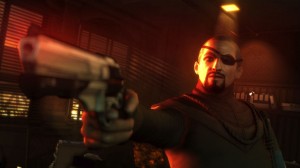 And off you go, yeah. That”s all you get. How do you put pitch and moment and sense of character into a guy whose only line of dialogue is saying “The princess is in another castle”? How do you make that guy interesting? how do you make him real?
And off you go, yeah. That”s all you get. How do you put pitch and moment and sense of character into a guy whose only line of dialogue is saying “The princess is in another castle”? How do you make that guy interesting? how do you make him real?
That was the kind of thing we went around and around and around in the writers” room about that. I like to think that we”ve done a good job with it. Proof will be in the pudding. A lot of people have been coming back from early previews of the game and saying they”re happy with the story. They like the characterisation, so that”s all coming up aces for us.
We just tried to create characters who felt real, in all senses and in all genders.
People with their own motivations?
Yeah, it”s not about men or women. It”s about characters. It doesn”t matter where they”re from or who they are. Is this a good character? Does this character feel real to me? And I feel we”ve done a really good job. It”s hard for me to be objective about it because I”m so invested and enthusiatic, but yeah.
When it comes to design, the marketing has talked a lot about the four pillars of choice. How did that affect your writing and storytelling? Was it a big thing?
Very much so. The unique problem that”s presented to us when we”re creating our characters, especially our lead, Adam Jensen… we could tell you as the player who Adam Jensen was, up until the point where you pick the controller up. We create a fully-realised background for him, backstory elements of mystery – you can play certain side-quests and uncover more elements of who he is, if that”s what you wanna do.
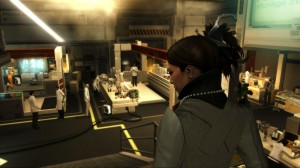 Once you pick up the controller we have NO idea what you”re gonna play. If you”re gonna play it stealthy – I used to compare it to things like “Do you wanna play Jack Bauer where he”s kicking down doors and beating the hell out of people? Do you wanna play him like Jason Bourne, where he”s being a bit more cool and professional? Or do you wanna go for something that”s a little bit more flippant, or a mixture of all these things?
Once you pick up the controller we have NO idea what you”re gonna play. If you”re gonna play it stealthy – I used to compare it to things like “Do you wanna play Jack Bauer where he”s kicking down doors and beating the hell out of people? Do you wanna play him like Jason Bourne, where he”s being a bit more cool and professional? Or do you wanna go for something that”s a little bit more flippant, or a mixture of all these things?
We couldn”t predict exactly what the player wants. Are you gonna play him like a jerk? As Mary was fond of saying the “Arsehole Adam”. You can play him that way if you want. You can go around kicking dogs and beating up complete strangers and generally being a dick. You can also play it in a much more sensitive, intersting and caring way.
We had to make sure that there was enough redundancy in the dialogue and the structure of the approaches that you have to characters when you”re talking to them that all of those choices would play. You wouldn”t be in a situation where you do something aggresive and a character talks back to you and it doesn”t reflect that you”ve just done something aggresive. Obviously it”s difficult to predict because the way the players work in a game is a chaotic system so we can”t nail everything down but we tried to accommodate whatever style of player you want and still try and reveal character through that progression.
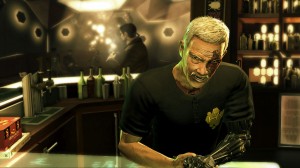 The holy grail of any game writing is to make sure that we keep you immersed as much as we possibly can. We want to make it feel like it”s organic to you, not “I”m playing this way so I will pick this answer.” It should feel right. That”s what we”ve aimed for. Hopefully we”ll achieve it.
The holy grail of any game writing is to make sure that we keep you immersed as much as we possibly can. We want to make it feel like it”s organic to you, not “I”m playing this way so I will pick this answer.” It should feel right. That”s what we”ve aimed for. Hopefully we”ll achieve it.
Have you done any other games work?
Oh yeah. I do a lot of different kinds of writing but I”ve been writing for video games since 1999. I did some early development work on Killzone 2 way, way back when it was a PS2 title. A few other games – Maelstrom, Battlestar Galactica, Star Trek: Invasion, very early development work on some stuff for Crysis 2. Lots of small little projects here and there. I think Human Revolution is probably… hand on heart, let”s say it. It”s the best games project I”ve ever worked on. I know you probably hear that a lot from people but in twelve years now of working in the video games industry, I”ve just had an absolute blast doing this. Not only have we had a great title, not only a great gang of people to work with but a terrific environment where we really felt like story was valued to a great degree.
Story in games, let”s face it, does have a bit of a hard road to go. There”s a lot of narrative which is basically, “You killed my brother, prepare to die” and that”s the best that you can get in game narrative. As a game writer I”m constantly flying the flag saying “We can do better than this. We can expand this. We can tell better, deeper, more compelling stories” because that”s what our audience expects. They get that from TV, movies, books, comics. Why can”t we give it to them in games? And best online casino we”re definitely aiming for that high watermark with HR so for me it was fun to be in a working environment with people who felt the same way. We wanted to bring that kind of dynamic story to it.
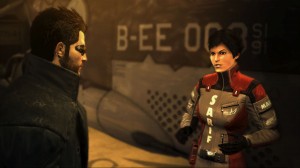 That was always the key point of Deus Ex, wasn”t it? Choice and story.
That was always the key point of Deus Ex, wasn”t it? Choice and story.
Absolutely. In a way I think that”s why story had such respect with this project because when we came into it from the very beginning the directors said “We know the story has to be important. It”s not something we can marginalise. That is this franchise. That is was fans of the franchise expect. That is what the name Deus Ex resonates with, in the games industry.” You talk to people about games that have fantastic story, you look at those Top Ten lists, Deus Ex is always on there without fail. Here is the game that came out in 1999. I first played that in Hong Kong, of all places, in 2001, the Game of the Year edition and little did I know that years later I would be asked to work on it.
It was kind of crazy actually, I got a call from a friend of mine who was offered the job and had to pass. He said “Oh, cyberpunk stuff? That”s right up Jim”s alley, yeah give him a call.” When they called me they said “It”s Deus Ex 3” and I was like, “How much do I have to pay you to work on this”.
I was a big fan . I played both the games. Invisible War gets a hard time from a lot of people but there were things about it that I really liked. I love that cyberpunk stylisation – that sort of milieu. For me it was a dream come true to work on this project.
I am a gamer. A lot of games writers I talk to, the GOOD games writers are people who game, obviously. That makes sense. If you were writing a movie you wouldn”t walk into Stephen Speilberg”s office and go “Well, I”ve never seen a film before but hey, Steve. Here”s my script.” And yet some poeple think that it”s okay to transplant writers from other mediums into games and think they”ll pick it up.
I don”t think that”s true. I think you need to be a gamer, you need to understand the tropes. You need to understand what it is, the strange kind of ephemeral, visceral thrill that you get from playing a game. When you”re really in that space and you lose yourself in it, it”s very different from the way you lose yourself when you”re reading a prose narrative or watching a feature film. I think you need to have a fundamental understanding of that feeling. I like to think I”ve got that understanding and I think the best writers in this industry have that connection. They are gamers and they are game writers. If you”re not both of those things, I think you”re missing something.
Is there anyone you would pick out specifically?
There aren”t that many of us game writers. I know most of them so anybody I don”t mention will be “Why didn”t you say _I_ was great?” I would pick out close friends of mine, people like Rhianna Pratchett [Heavenly Sword, Overlord], a brilliantly talented writer. My good friend Andy Walsh [Halo 3, Bodycount], Richard Dansky over in the US [Splinter Cell: Conviction], Matt Forbeck, top guy. I could go on and on and on.
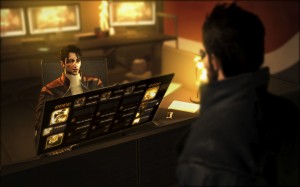 There are a lot of really talented people, a lot of really good writers and I think we”ve reached the point now where games writing is starting to accrete respect to the point where it”s not just the thing where you get to end of the game development cycle and go “Oh yeah, we need a script.” I”ve had jobs like that where people bring you in at the last minute and go “Can you sprinkle your magical writer pixie dust on our script and make it not crap?”
There are a lot of really talented people, a lot of really good writers and I think we”ve reached the point now where games writing is starting to accrete respect to the point where it”s not just the thing where you get to end of the game development cycle and go “Oh yeah, we need a script.” I”ve had jobs like that where people bring you in at the last minute and go “Can you sprinkle your magical writer pixie dust on our script and make it not crap?”
No! You should have called me 6 months ago when I could have helped you make this story make sense. With writing, we”re kind of where music and sound effects were with games five or ten years ago. There”s that point when sudenly the ability to give games an operatic theatrical soundtrack and quality sound bounced out because you could afford a better sound card for your PC. Now you listen to the music and effects and they have a fantastic aural soundscape.
There was that stage when music suddenly became a much more integral, much more vibrant part of game design. I think writing is in that space right now. People are waking up the fact “Hey, we don”t have to just tack on a storyline. We can tell something really clever and interesting. We can get people in and embed them from the start. Bring a writer into the room and have them add their energy to the project. For me as a writer it”s an exciting time to be part of this business.
Back in the 30s and 40s when television first took off you had people who wrote for radio, who wrote for theatre and then TV turned up and it was this new kind of writing for story. People were discovering how to tell cool stories in television. It was a paradigm shift. It was a brand new medium and this is where we are with games. We”ve got this brand new way of telling stories – interactive storytelling. If we can do that, to be at the crest of that wave is just really cool. I”m so enthusiastic to be there.
Thank very much for talking to us.
Deus Ex: Human Revolution is available now on PC, Xbox 360 and PS3.

Follow Us!